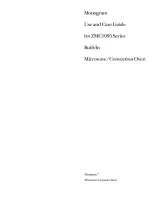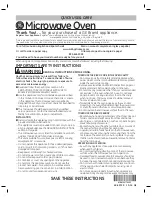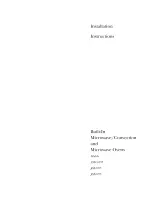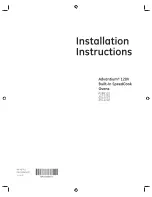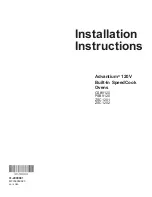
R-895M - 14
C
HIGH VOLTAGE RECTIFIER TEST
CARRY OUT 3D CHECKS.
Isolate the high voltage rectifier assembly from the HV circuit. The high voltage rectifier can be tested
using an ohmmeter set to its highest range. Connect the ohmmeter across the terminal B+C of the high
voltage rectifier and note the reading obtained. Reverse the meter leads and note this second reading.
The normal resistance is infinite in one direction and more than 100 k
Ω
in the other direction.
CARRY OUT 4R CHECKS.
ASYMMETRIC RECTIFIER TEST
CARRY OUT 3D CHECKS.
Isolate the high voltage rectifier assembly from the HV circuit. The asymmetric rectifier can be tested
using an ohmmeter set to its highest range across the terminals A+B of the asymmetric rectifier and
note the reading obtained. Reverse the meter leads and note this second reading. If an open circuit is
indicated in both directions then the asymmetric rectifier is good. If the asymmetric rectifier is shorted
in either direction, then the asymmetric rectifier is probably faulty and must be replaced with high voltage
rectifier. When the asymmetric rectifier is defective, check whether magnetron, high voltage rectifier,
high voltage wire or filament winding of the high voltage transformer is shorted.
CARRY OUT 4R CHECKS.
NOTE: FOR MEASUREMENT OF THE RESISTANCE OF THE RECTIFIER, THE BATTERIES OF
THE MEASURING INSTRUMENT MUST HAVE A VOLTAGE AT LEAST 6 VOLTS, BECAUSE
OTHERWISE AN INFINITE RESISTANCE MIGHT BE SHOWN IN BOTH DIRECTIONS.
CARRY OUT 3D CHECKS.
Disconnect the leads to the primary winding of the high voltage transformer. Disconnect the filament
and secondary winding connections from the rest of the HV circuitry. Using an ohmmeter, set on a low
range, it is possible to check the continuity of all three winding. The following readings should be
obtained:-
a. Primary winding ................................ approximately 1.9
Ω
b. Secondary winding .......................... approximately 124
Ω
c. Filament winding ......................................... less than 1
Ω
If the readings obtained are not stated as above, then the high voltage transformer is probably faulty
and should be replaced.
CARRY OUT 4R CHECKS.
D2
D1
ASYMMETRIC
RECTIFIER
HIGH VOLTAGE RECTIFIER
CARRY OUT 3D CHECKS.
A. Isolate the high voltage capacitor from the circuit.
B. Continuity check must be carried out with measuring instrument which is set to the highest
resistance range.
C. A normal capacitor shows continuity for a short time (kick) and then a resistance of about 10M
Ω
after it has been charged.
D. A short-circuited capacitor shows continuity all the time.
E. An open capacitor constantly shows a resistance about 10 M
Ω
because of its internal 10M
Ω
resistance.
F. When the internal wire is opened in the high voltage capacitor shows an infinite resistance.
G. The resistance across all the terminals and the chassis must be infinite when the capacitor is
normal.
If incorrect reading are obtained, the high voltage capacitor must be replaced.
CARRY OUT 4R CHECKS.
D
HIGH VOLTAGE CAPACITOR TEST
WARNING:
High voltage and large currents are present at the secondary winding and
filament winding of the high voltage transformer. It is very dangerous to work
near this part when the oven is on. NEVER make any voltage measurements
of the high-voltage circuits, including the magnetron filament.
TEST PROCEDURES
B
HIGH VOLTAGE TRANSFORMER TEST
PROCEDURE
LETTER
COMPONENT TEST































